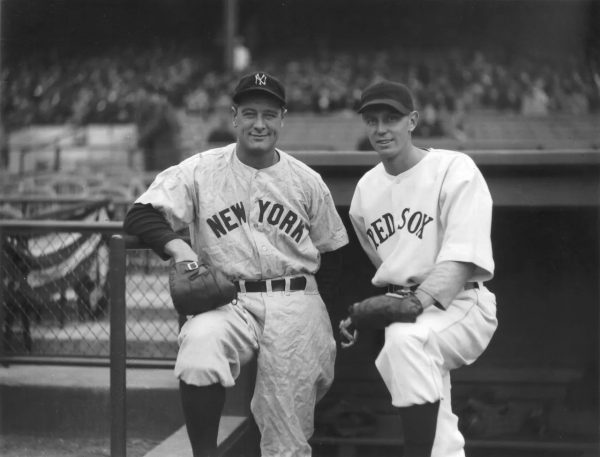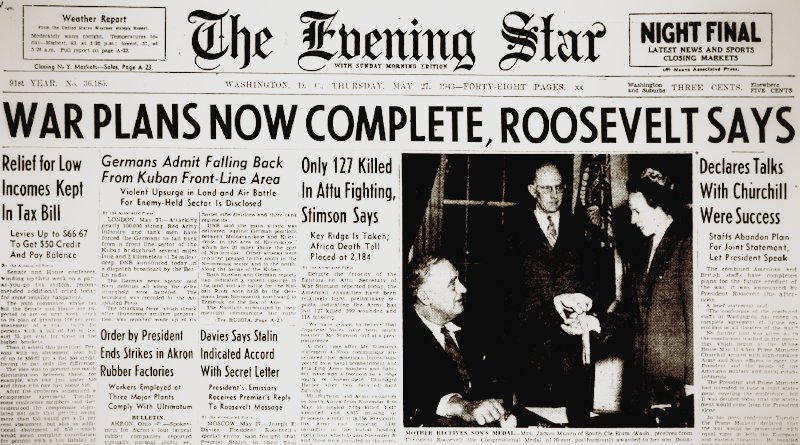World War II Chronicle: May 27, 1943
Click here for TODAY’S NEWSPAPER
On the front page, the mother of Douglas Munro is swearing in to the Coast Guard women’s auxiliary force known as SPARS. Her son was posthumously awarded the Medal of Honor for actions on Guadalcanal last year. Today she and her husband received their son’s medal from President Roosevelt and she accepted a commission as a lieutenant (junior grade). Story on page two… Also on two, Eighth Air Force gunners shot down a record 74 German fighters during a raid on the sub yards at Emden and Wilhelmshaven. 12 bombers are lost in the mission…
On page four, Japanese radio has announced that Adm. Isoroku Yamamoto perished when his ship was sunk after a heroic fight… George Fielding Eliot discusses strategic bombing on page 12… The sports section begins on page 20.and reports that Phillies shortstop Babe Dahlgren may be drafted soon. Dahlgren replaced Lou Gehrig when the Iron Horse’s streak of 2,130 consecutive games ended in 1939. He was remarkable at first base, so good in fact Joe DiMaggio said his leather work made the fielders lazy. Somehow a rumor got started that he smoked marijuana that chased him his entire career. He told commissioner Kennesaw Mountain Landis that he wanted to be medically tested to dispel his critics, but the commissioner died before he could put an end to the rumor mill. The next round of physical examinations eliminates Dahlgren from service due to a sinus condition and he makes the All-Star team in 1943.

Roving Reporter by Ernie Pyle
IN TUNISIA (By Wireless) — While with the infantry in the north Tunisian campaign I had to live of course just as they did. Our home was on the ground. We sat, ate and slept on the ground.
We were in a different place almost every night, for we were constantly moving forward from hill to hill. Establishing a new bivouack consisted nothing more than digging new foxholes. We never took off our clothes, not even our shoes. Nobody had more than one blanket, and many had none at all.
For three nights I slept on the ground with nothing under or over me. Finally I got one blanket and my shelter halves sent up.
We had no warm food for days. Each man kept his own rations and ate whenever he pleased. Oddly enough I was never conscious of the lack of warm food. Water was brought o us in cans, but very little washing was done.
Sometimes we were up all night on the march and then would I sleep in the daytime till the hot sun made sleep impossible. Some of the men slept right in their foxholes, others on the ground alongside. Since rocks were abundant, most of us buttressed our foxholes with little rock walls around them.
During that week we were shot at by 88s, 47s, machine guns and tanks. Despite our own air superiority we were dive-bombed numerous times, but they were always in such a hurry to get it over and get home usually their aim was bad and the bombs fell harmlessly in open spaces. You could always count on being awakened at dawn by a dive-bombing.
Having now been both shelled and bombed, I believe an artillery barrage is the worst of the two. A prolonged artillery barrage comes very close to being unbearable, and we saw many pitiful cases of “anxiety neurosis.”
The nights were sometimes fantastic. The skies would flash all night from the muzzle blasts of the big guns. Flares shot from the ground and dropped from planes would hang in the sky. Armored vehicles would rumble across country all night. German planes would thrum through the skies seeking some flash of light on the ground.
At dusk groups of litter-bearers would set out to carry the wounded from forward companies. Just after dawn each morning the stretchers and the walking wounded would come slowly down hill from the night’s fighting. Ammunition carriers in long lines toiled up to us carrying those triple clusters of heavy mortar shells on their shoulders.
A couple of miles behind us the engineers worked day and night without cease, digging and blasting and bulldozing passes through the hills so our wheeled vehicles could follow the advance.
Sometimes we didn’t sleep at all for 30 hours or more. At first the activity and excitement and everything kept me awake. I didn’t want to go to sleep for fear of missing something. Also, at first the terrific noise of the artillery kept us awake. But on my last two nights in the lines I slept eight hours solid and never heard a thing.
During all the time we were under fire I felt fine. The catch-as-catch-can sleep didn’t seem to bother me. I never felt physically tired even after the marches. The days were so diverse and so unregimented that a weep sped by before I knew it. I never felt that I was excited or tense except during certain fast-moving periods of shelling or bombing, and these were quickly over. When I finally left the line just after daylight one morning I never felt better in my life.
And yet, once I was safely back in camp an intense weariness came over me. I slept almost every minute of two days and nights. I just didn’t have the will to get up, except to eat. My mind was as blank as my body was lifeless. I felt as though every cell in my make-up had been consumed. It was utter exhaustion such as I had never known before. Apparently it was the letdown from a week of being uncommonly tense without realizing I was tense. It was not until the fourth day that I began to feel really normal again, and even now I’m afraid I think too much about the wounded men.
Moral — German 88-mm. shells are evil companions and their company should be avoided.
Evening star. (Washington, D.C.), 27 May 1943. Chronicling America: Historic American Newspapers. Lib. of Congress.
https://chroniclingamerica.loc.gov/lccn/sn83045462/1943-05-27/ed-1/
